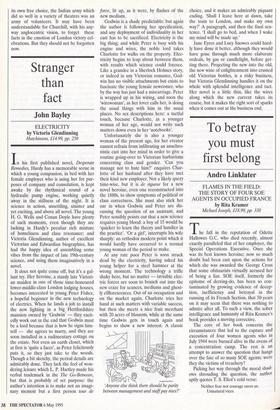Stranger than fact
John Bayley
ELECTRICITY by Victoria Glendinning Hutchinson, £14.99, pp. 250 In his first published novel, Desperate Remedies, Hardy has a memorable scene in which a young companion, in bed with her female employer who is using her for pur- poses of company and consolation, is kept awake by the rhythmical sound of a hydraulic pump engine, working quietly away in the stillness of the night. It is science in action, unsettling, sinister and yet exciting, and above all novel. The young H. G. Wells and Conan Doyle have plenty of such moments, even though they are lacking in Hardy's peculiar rich mixture of homeliness and class resonance: and Victoria Glendinning, author of excellent Victorian and Edwardian biographies, has had the happy idea of assembling some vibes from the impact of late 19th-century science, and using them imaginatively in a novel.
It does not quite come off, but it's a gal- lant try. Her heroine, a sturdy late Victori- an maiden in one of those time-honoured lower-middle-class London lodging houses, becomes interested in young Peter Fisher, a hopeful beginner in the new technology of electrics. When he lands a job to install the new lighting in a big Hertfordshire mansion owned by 'Godwin' — they excit- edly work out in the end that Godwin must be a lord because that is how he signs him- self — she agrees to marry, and they are soon installed in a rudimentary cottage on the estate. Not even an earth closet, which at first is 'quite a facer', as Peter felicitously puts it, so they just take to the woods. Though a bit sketchy, the period details are admirably done. They lack the feel of won- dering leisure which L. P. Hartley made his verbal trademark in the The Go-Between, but that is probably of set purpose: the author's intention is to make not an imagi- nary memoir but a first person tour de force, lit up, as it were, by flashes of the new medium.
Godwin is a shade predictable: but again the author is following her specification, and any deployment of individuality in her cast has to be sacrificed. Electricity is the big thing; and while Peter is busy with his engine and wires, the noble lord takes Charlotte for walks on the property. Elec- tricity begins to leap about between them, with results which science could foresee. Like a grandee in a Sherlock Holmes story, or indeed in any Victorian romance, God- win has no visible attachments but exists to fascinate the young female newcomer, who by the way has just had a miscarriage. Peter is wrapped up in his wiring, and soon the `wirewoman', as her lover calls her, is doing the usual things with him in the usual places. No sex descriptions here: a tactful touch, because Charlotte, as a younger woman of her age, would not write such matters down even in her 'notebooks'.
Unfortunately she is also a younger woman of the present age, for her creator cannot refrain from infiltrating an anachro- nistic cast into her mind in order to give a routine going-over to Victorian barbarisms concerning class and gender. 'Can you manage not to hate him?' enquires Char- lotte of her husband after they have met their kind new employer. Not a likely query time-wise, but it is de rigueur for a new novel heroine, even one reconstructed into the 1880s, to show symptoms of political or class correctness. She must also stick her oar in when Godwin and Peter are dis- cussing the question of an assistant, and Peter sensibly points out that a new science requires young blood: a boy of 15 would be `quicker to learn the theory and handier in the practice'. 'Or a girl', interrupts his wife sharply: an orthodox modern point which it would hardly have occurred to a normal young woman of the period to make.
At any rate poor Peter is soon struck dead by the electricity, having asked his young helper for a steel hammer at the wrong moment. The technology a trifle shaky here, but no matter — invisible elec- tric forces are soon to branch out into the new craze for seances, mediums and ghost- ly efflorescences. Out of an occupation and on the market again, Charlotte tries her hand at such matters with variable success, but then she meets a nice fruit merchant with 20 acres of blossom, while at the same time Godwin gets in touch again and begins to show a new interest. A classic Anyone else think there should be parity between management and staff pay rises?' choice, and it makes an admirably piquant ending. 'Shall I leave here at dawn, take the train to London, and make my own way?' A paragraph, and then the final sen- tence. 'I shall go to bed, and when I wake my mind will be made up.'
Jane Eyres and Lucy Snowes could hard- ly have done it better, although they would have gone through much more elaborate ordeals, by gas or candlelight, before get- ting there. Projecting the new into the old, the new wine of enlightenment into crusted old Victorian bottles, is a risky business, but Victoria Glendinning handles it on the whole with splendid intelligence and tact. Her novel is a little thin, like the wires along which the new current takes its course, but it makes the right sort of sparks when it comes out at the business end.


































































 Previous page
Previous page